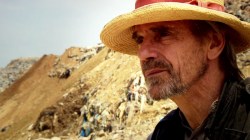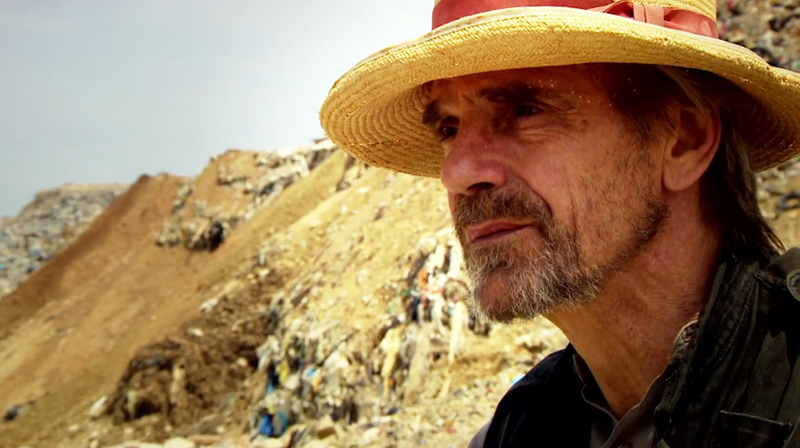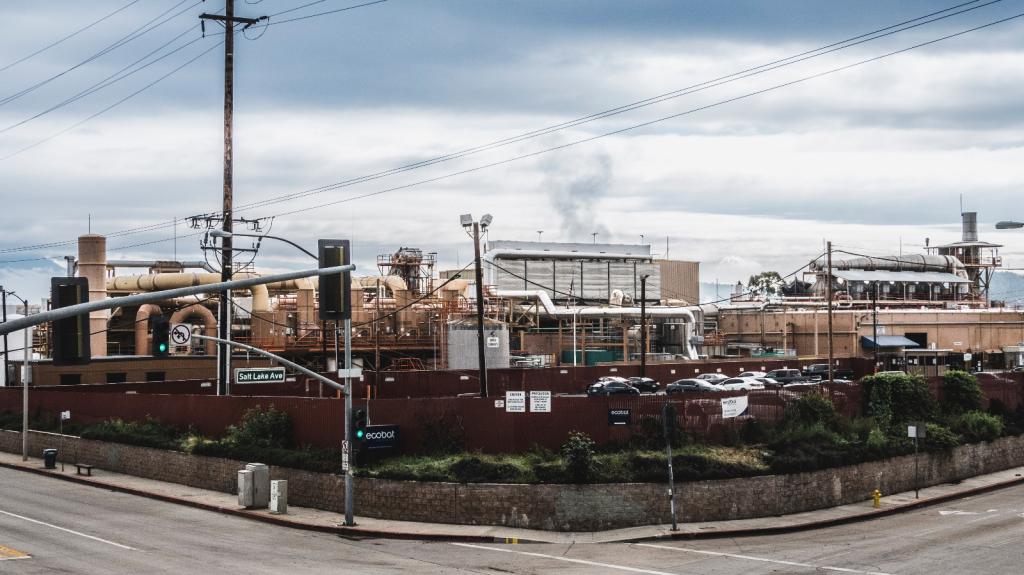 Jeremy Irons has played some serious douchebags: Scar, Claus von Bülow, Simon Gruber, the ultimate caricature of the 1% in Margin Call, the cauldron in Once Upon a Halloween (oh, did you miss that one?). The point is, it’s a little disconcerting to see him tromping around a Lebanese dump in rubber boots and a sad little straw hat, empathizing with a Palestinian refugee who picks trash for a living. But just because he’s so good at being villainous onscreen doesn’t mean that he can’t have his concerned celebrity cause movie. And the cause Irons chose is garbage.
Jeremy Irons has played some serious douchebags: Scar, Claus von Bülow, Simon Gruber, the ultimate caricature of the 1% in Margin Call, the cauldron in Once Upon a Halloween (oh, did you miss that one?). The point is, it’s a little disconcerting to see him tromping around a Lebanese dump in rubber boots and a sad little straw hat, empathizing with a Palestinian refugee who picks trash for a living. But just because he’s so good at being villainous onscreen doesn’t mean that he can’t have his concerned celebrity cause movie. And the cause Irons chose is garbage.
Trashed, a documentary directed by Candida Brady and executive-produced by and starring Irons (with a score by Vangelis), looks at the toxic effects an endless worldwide buildup of waste has on our health and environment. To be honest, I kind of wish such a powerhouse of film-industry talent had tackled a slightly more cutting-edge or original issue — I mean, Jeremy Irons’ voice over a Vangelis theme is a surefire way to lend gravity to any situation, and it just seems a bit of a waste (ahem) to use such drama to approach what I see as a pretty broad, old-school environmental issue: We throw too much shit away! We should recycle instead! Yeah, and did you know there’s a hole in the ozone layer?
That said, Trashed lays out the scope of the situation pretty effectively, starting with the problem of our dumps filling to capacity, leading many cities to resort to incineration, which may get rid of the trash itself, but releases dioxins into the environment that ruin farmland and cause cancer and birth defects. These toxins have become so prevalent that everyone contains low levels of them in their body, but high levels can be especially harmful to developing fetuses. This means it can take a generation after initial exposure for the effects to become obvious.
While there is still debate in the scientific community about what the long-term effects of dioxin exposure may be, Trashed provides a horrifying example of worst-case-scenario dioxin poisoning when Irons visits a hospital room in Vietnam filled with jars of preserved, deformed fetuses — severely conjoined twins, misshapen heads, etc. The scene made me suddenly sit up and pay attention to a film I was getting ready to dismiss as another lackluster doom-and-gloom doc. These specimens were probably victims of the most deadly dioxin, TCDD: Agent Orange to you and me, famously sprayed as a defoliant during the Vietnam War.
Then Irons goes to a hospital unit full of children “lucky” enough to survive with severe deformities — we’re talking kids with no eyes, missing limbs, breathing tubes. As only a brief segment, this part of the movie felt a little like a cheap freak-show tactic to get our attention, but the shock value is certainly effective. These kids were born 30 years after the war. What other appalling results of toxic waste contamination have we yet to see?
Irons showcases other problematic examples of waste buildup by exploring the Great Pacific Garbage Patch and visiting poor people who try to eke out a living by combing through heaps of trash for items they can resell (a common occupation in cities across the globe). Meanwhile, every day the piles grow higher with the cast-off byproducts of our throwaway culture.
He also highlights San Francisco’s progress toward its zero-waste goal (through an extensive compost and recycling program) as an example of how we could be dealing more responsibly with our refuse. The city now recycles 75 percent of its waste; getting to that level throughout the United States (the country as a whole recycles only 33 percent of waste), the film says, would create 1.5 million jobs.
The story of San Francisco’s success also provides more support for the growing argument that cities are the entities best positioned to lead action on many sustainability efforts. Cities are smaller and more cohesive than states or nations, obviously, but urban areas also house over half the world’s population. If every city achieved what San Francisco has, we could actually make significant progress where reducing waste is concerned.
Other than the Agent Orange babies, whose bleak existence you’ll remember next time you’re about to casually chuck something in the garbage, there’s little in Trashed that will shock you or offer a new perspective on long-established global dilemmas like toxic waste, landfill overflow, plastic pollution, and melting Arctic ice. But it will make you appreciate that beneath Irons’ hawk-like gaze and haughty accent, this intimidating on-screen villain spends time being a good guy in real life.
Check out the trailer:



